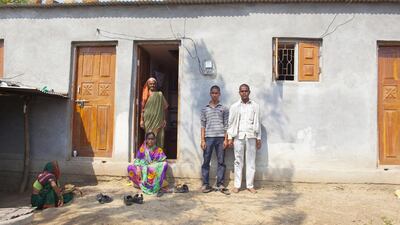MUMBAI // India’s high rate of farmer suicides is largely due to globalisation and increased expectations for a minimal acceptable lifestyle, experts say.
Crop failure, drought, floods and indebtedness are the most frequently cited factors in the suicides of Indian farmers – about 300,000 in the past 20 years, according to government figures.
But researchers say this view is too simplistic.
“The changes in overall society have contributed to farmer suicides,” said Milind Potdar, a psychiatrist based in Latur, central Maharashtra, an area heavily afflicted by farmer suicides. Dr Potdar has been researching the rising number of farmer suicides the district has seen over the past five years.
“Globalisation has had a definite impact,” he said. “Farmers in the villages used to be satisfied with whatever little they had, but globalisation has brought everything to the doorstep – there has been a rise in the expectation of living standards and in practicality the actual economic status has gone down, which causes stress.”
The move away from joint families to nuclear families has also placed the stress of having to provide for their families on individual farmers, he said.
Farmer suicides in India rose to 8,007 in 2015 from 5,650 the previous year – an increase of 41.7 per cent, according to data released by the National Crime Records Bureau this year.
Maharashtra state accounted for the highest number of farmer suicides among Indian states last year – with 4,291 cases – compared to 1,569 in Karnataka, and 1,290 in Madhya Pradesh.
Maharashtra also suffered severe drought in 2014 and 2015, although the impact was only felt in the first half of 2016.
While the drought eased after last year’s monsoon season, Dr Potdar said farmers were “still not earning what they are spending”, and suicides continued in the central Maharashtra area.
“There’s never going to be zero farmer suicides if the situation remains the same,” Dr Potdar said. “A lot of things can be done at a policy level.”
He said farmers need to have enough crops to at least cover costs or make some profit, but “that is not being implemented”.
Dr Potdar highlighted the fact that India had gone through even more severe droughts in the 1970s without this many cases of farmer suicides.
Bankruptcy and indebtedness were cited as primary factors in 38.7 per cent of farmer suicides in 2015, followed by farming-related issues which were responsible for 19.5 per cent. Other factors included family problems and drug and alcohol addiction. Seventy-two per cent of the suicides were by small-scale farmers with less than two hectares of land.
Prahlad Devarhubli – a farmer with about 12 hectares of land in Belgaum, Karnataka – has served as the state government's adviser to the central government's minimum price support committee. He said a large number of farmer suicide cases were not because of debts from agriculture, but because of debts related to "other expenses", including paying for a daughter's wedding and dowry, and generally overspending.
“About 30 years back, farmers just ate bread, had two pairs of clothes, they had a hut to stay in, and there was no demand for the amenities and all,” Mr Devarhubli said.
“Now they require TV, they require mobile, and vehicles. Their cost of living is much higher now. Even the food consumption style has increased now and farmers and their families eat costly food in our villages. Demand and requirement has gone up and their income is not at par with those expenses.”
Radha Mohan Singh, India’s minister of agriculture and farmer welfare, said last month that the government was conducting a study of the problem of farmer suicides and remedial policies in major suicide-hit states of the country.
In addition, India’s supreme court in January called for a national policy to protect farmers and asked the central government, state governments and the central bank to look for ways to solve the problem of farmer suicides.
In Karnataka, a farmer makes an average profit of 75,000 rupees (Dh4,071) to 100,000 rupees per hectare of irrigated land per year after middlemen have taken their cuts, according to Mr Devarhubli.
The net profit from non-irrigated land would be about 10,000 to 12,500 rupees, he said.
It is difficult to generate profits from the small land areas held by many of India’s farmers, he said.
A policy overhaul was required to make sure that farmers received a higher share of the profits, he said, as the current scenario is that middlemen are taking a lot of the profits.
foreign.desk@thenational.ae
__________________________________
India suicides
■ India drought drives farmers to suicide
■ Dowries and death continue apace in India
■ Indian expat in Oman becomes latest to commit suicide due to debts
__________________________________

